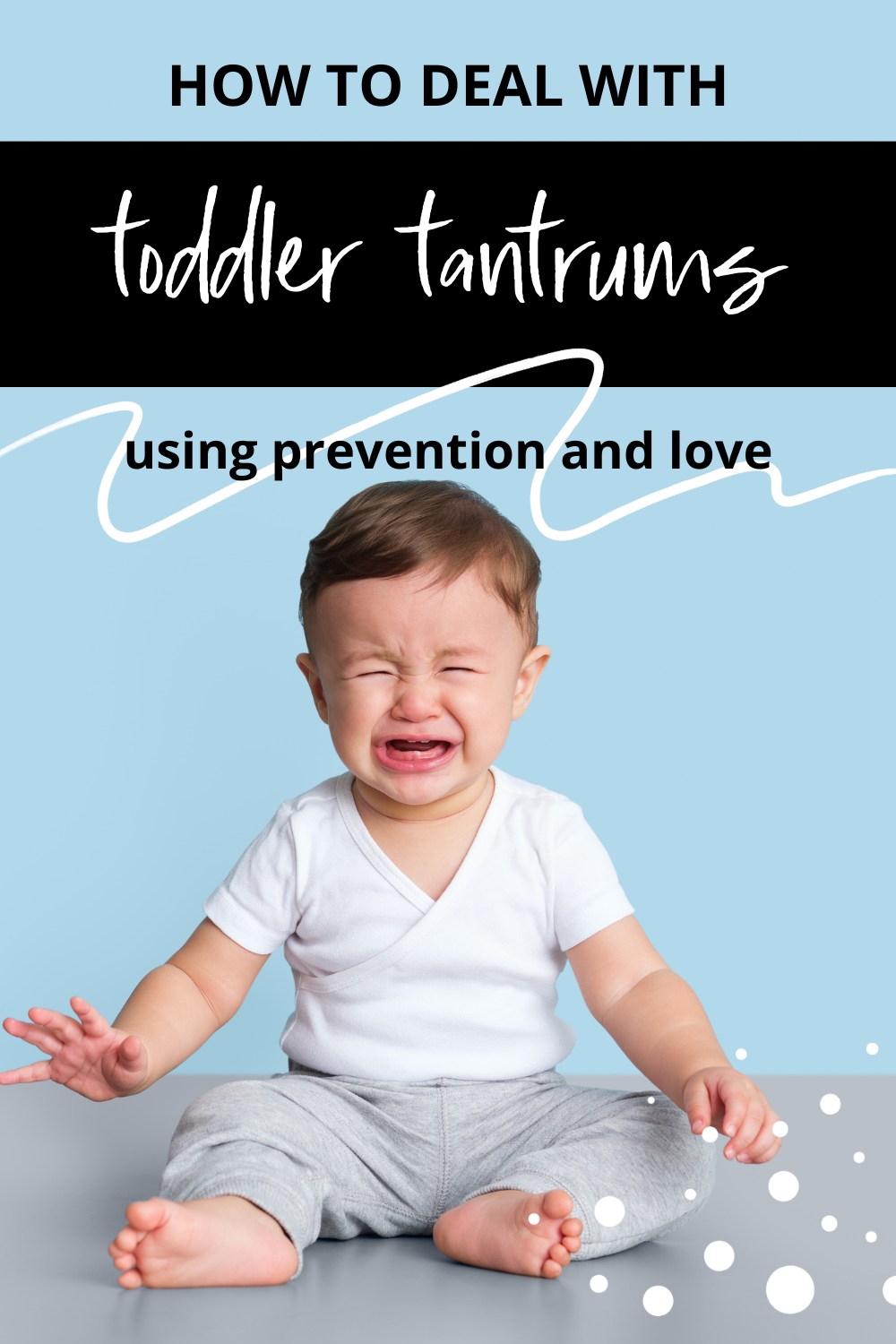Toddler tantrums are often difficult for parents to cope with, when a child is totally out of control, it can be embarrassing and a bit frightening.
So how can we deal with temper tantrums in the best way? Let’s dive in!

Dealing With Toddler Temper Tantrums The Best Ways
What is a Temper Tantrum?
First, let’s talk a bit about what a temper tantrum is. Anyone can get angry and lash out, obviously. So when does an outburst count as a tantrum?
According to Sisterhen LL, Wy PAW. Temper Tantrums, “temper tantrums are brief episodes of extreme, unpleasant, and sometimes aggressive behaviors in response to frustration or anger. The tantrum behaviors are usually disproportionate to the situation. In toddlers, behaviors typically include crying, screaming, going limp, flailing, hitting, throwing items, breath-holding, pushing, or biting.”
So, it is pretty intense behavior, disproportionate to the situation. Sounds familiar?
Toddler Tantrums are Normal
Tantrums are pretty normal in a two year old. Life can be pretty frustrating sometimes, they are just learning to communicate verbally, though they understand a lot more than they can talk. In actual fact, having a child who is determined to let the world know what she wants or when she is unhappy, is a great thing. She will do very well!
Of course we hope our kids learn more productive ways of getting their needs met as they grow older!
Tantrums Statistics (to Put Things in Perspective)
As mentioned, toddler tantrums are normal, at least within a range. Tantrums are the most common between the ages of two and three years, but may actually start as early as 1 year old. Research studies indicate the following statics on temper tantrum frequency and lenght at different ages:
- Tantrums occur in 87% of 18 to 24-month-olds, 91% of 30 to 36-month-olds, and 59% of 42 to 48-month-olds.
- It is common for toddlers to have a tantrum at least once per day, as is the case for 20% of two-year-olds, 18% of three-year-olds, and 10% of four-year-olds.
- Five to seven percent of one-to three-year-olds have tantrums lasting at least fifteen minutes three or more times per week.
- Children with language deficits or autism may have more frequent and aggressive tantrum behaviors because of the additional frustration associated with difficulty expressing themselves.
- Breath-holding events may occur during tantrums and affect 0.1 to 4.6% of otherwise healthy children. Breath-holding spells typically occur between six months and five years of age, with onset between 6 and 18 months, and disappear by five years of age.
- There are no documented differences in the prevalence of temper tantrums by gender or race/ethnicity.
Why do Toddlers Have Tantrums?

Children have tantrums when they are emotionally overwhelmed by a situation. The neuro-scientific explanation to what is going on is that two parts of the brain – the amygdala and the hypothalamus – work to protect the child. The amygdala signals that something serious, a threat, is going on, and the hypothalamus makes sure that the child acts or reacts to the situation. This is what is sometimes referred to our reptilian brain, as it is operating to keep us alive.
As we grow older, a third part of our brain, the prefrontal cortex help us control our reactions. However, this “rational” part of the brain develops more slowly, and is actually not fully developed until adulthood.
So, even though we as adults define tantrums as strong reactions that are disproportionate to the situation, we need to remember that the reactions are not disproportionate based on the child’s age and ability to control their emotions through logical thinking and impulse control. They simply can’t. Just like they can’t yet read or spot cars that come driving quickly. Their brains are not fully developed yet. This is so important to remember!
For example, sometimes little ones will have a meltdown out of frustration at trying to get us to do something, or to say what they want. In this case, starting to reason with them to make them stop is meaningless. Just validate their feelings – “I know it’s so hard trying to get Mommy to understand. I’m trying to figure it out, let’s just see if we can work out what you want.”
Or if they are getting frustrated because you are not quick enough to respond to them, then try to help them to learn patience (VERY hard!) – “Whoa, – wait a minute, I’ll get your milk soon.” Then burst into song or counting to distract them for a few minutes!
Remember that it is a waste of time trying to explain or rationalize anything to a child who is already out of control. You have to wait until they calm down. Even then, don’t go into big lectures, just say “I know it’s hard sometimes when Mommy makes you get dressed, but sometimes we just have to get ready to go out”.
Common Temper Tantrum Triggers
All kids are different, but there some common triggers for toddler tantrums:
- Physiological triggers such as fatigue, hunger, or illness.
- Stress
- Frustration for one reason or the other, like for example trying to get us to do something, or to communicate what they want
- Learned behavior; they have learned (subconsciously) that tantrums are an effective way to get what they want or avoid something they don’t want.
What to do During a Tantrum?
Keep Calm
What do you do if your child is already having a full blown tantrum? Keep calm! Let them have their feelings, say very little, except maybe acknowledge their feelings – “I can see you’re really cross right now,” or “that makes you so mad.”
Keep Your Child Safe
Make sure they are safe, some kids totally lose control and can hurt themselves, or others. If you have to, to keep them safe, you can contain a child but holding them from behind, pinning their arms. That way they can’t kick you and can’t hit anyone. This will make them madder for a while, but just keep calm and say I’ll let go when you calm down a bit. And just quietly say, shh shh, or hum – just calming noises.
Reinforce Gaining Control
If the tantrum is a bid for attention, (and there is nothing wrong with a child seeking attention) you don’t want to reinforce them getting attention through bad behavior, rather say quietly, “when you have finished, we’ll sit and have a story, or play a game.” So you are rewarding them getting control again.
Ignore the Drama
Ignoring the drama is also a good way to let it run out of steam. Particularly if it is a demand for something unacceptable, say a meltdown over a cookie demand. Just stay calm and centered (easier said than done I know!) and say, “sorry sweetie, no more cookies today, but you can have a banana instead.”
Never Punish The Child
Never punish a child for a tantrum. Time out can be useful as a tool to regroup, but I don’t agree with the idea of a child being isolated and made to feel bad. Better to help them to take time out to take a deep breath or cuddle time on the couch. Or let’s just go outside for a few minutes to settle down – or have a big yell!
Here are more ideas on how to avoid losing your own control when your child acts out.
How to Prevent a Tantrum
Unrealistic expectations
Many toddler tantrums are actually set up by the parent! We often have unrealistic expectations for our kids, and we expect them to comply with what we want assuming they will accept our agenda is best/most important. Of course our kids have their own ideas about what is most important to them, and don’t always have the capacity to switch gears and go along with our plans.
If you are aware when the tantrum risk times are, you can often head them off.
Time pressure
Time pressure is often a huge factor, if we don’t allow our kids enough time to transition from one activity to another then the odds are they are likely to have a meltdown. You can manage transitions by having little routines that get familiar to the child that brings their attention to getting ready to move to the next activity.
If you child regularly has a meltdown when it is time to get ready for bed, You can have a piece of music that gives the signal it is time to quieten down, or a song you start singing. Changing the energy from excitement to something quiet and more mellow will help to calm the way.
The Morning Stress
If your child is more likely to have a tantrum because you are rushing to get her out the door, then allow more time, and give lots of short simple preparation statements, like “nearly time to get your clothes on” or “we’re going in the car soon”. The trick is to start to make the next activity sound way more exciting than what they are doing.
Kids are motivated by what makes them feel good in the moment, and to learn to think ahead and anticipate is actually a skill to learn. Rushing a child is often counterproductive, if they have a tantrum, then you end up taking longer anyway.
Ignore Other People
If your child is likely to have a meltdown in the supermarket, or in public, first of all TOTALLY ignore anybody else. Too bad what others are thinking, if you buy into that you will make the issue worse as then we tend to try to control or shut the child up and get angry ourselves.
Involve Your Child
Make sure you don’t end up going shopping when your little one is tired and hungry or you are likely to set yourself up for problems. Always take goodies with you, little packets of sultanas can keep little fingers busy for a while. Get the child involved, “Find the red packet; Can you see Daddy’s cereal? Which is our Yoghurt?”
You can start counting games, or singing rhymes to head off a tantrum and gain cooperation. Marching Marching where have the shoes gone? Tip Toe Tip Toe Tip Toe, (whisper) where are the pajamas hiding? You can role play the teddy saying, “I’m so tired, I want to go to bed, where’s my jammies?” Or, “Peppa Pig wants to brush her teeth, come on Peppa, lets see how many teeth you’ve got.”
Don’t Give In, But Don’t Be Unreasonable
Don’t give into toddler tantrums. Your aim is that your little girl or boy will learn to get control of their feelings. If you give in and let them have their way, then you are actually reinforcing the reptilian reactionary brain.
BUT, on the other hand, take stock and think if you are being unreasonable. If you are trying to make a child eat something when they have clearly indicated they have had enough, or you have set up a situation that has become a battle, then switch gears. Come up with a compromise, such as OK, I can see you are not going to do this right now, let’s just sit over here until you have calmed down.
If it is something you HAVE to get done, then offer a bribe! Don’t try to explain or bribe while the tantrum is happening. Wait until the energy has calmed, then you can offer a compromise. For example, when you’ve brushed your teeth, then we can have a story. Or, you can wear your Micky Mouse Tee Shirt to bed, but we have to take off your shoes first.
Pick Your Battles
Ask yourself how important are the things you are trying to make the child do. We often have a sort of rulebook in our head that says you have to do XYZ before bed. But if you have a child that is exhausted and having a meltdown, does it really matter if they skip brushing teeth once?
Just be careful not to make a habit of giving in. Rather than give in, try to change tactics – you are the one in the driver’s seat, not your two year old. But respect their right to think their needs are more important than yours, and that they have a right to be cross when us big people impose our rules on them!
Hope you find some useful ideas,
Most of all, enjoy your little cutie, it is such an exciting age, the world is opening up for them!
Read Next About Toddlers
- Toddler Refuses to Eat: Great Alternatives to Forcefeeding!
- Why Isn’t My 18 Month Old Daughter Sleeping Through the Night?
- 8 Things to Do Instead of Losing Temper with Your Toddler
Research References
- The Science of Tantrums
- Temper Tantrums in Toddlers and Preschoolers: Longitudinal Associations with Adjustment Problems
- Temper Tantrums

Paula Dennholt founded Easy Baby Life in 2006 and has been a passionate parenting and pregnancy writer since then. Her parenting approach and writing are based on studies in cognitive-behavioral models and therapy for children and her experience as a mother and stepmother. Life as a parent has convinced her of how crucial it is to put relationships before rules. She strongly believes in positive parenting and a science-based approach.
Paula cooperates with a team of pediatricians who assist in reviewing and writing articles.







